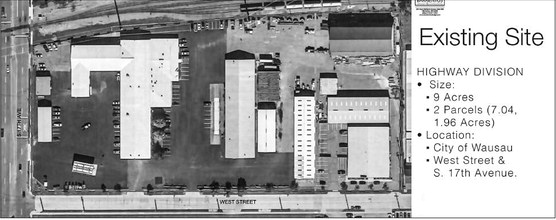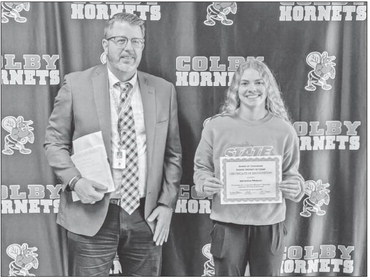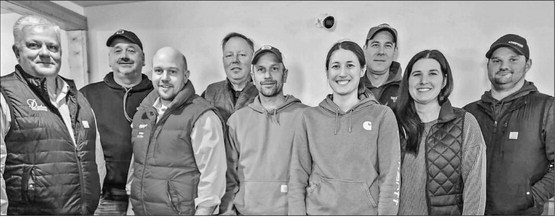Kicking the can down the road?


By Kevin O’Brien
With state aids and other sources of revenue stagnating, Marathon County finds itself at a crossroads when it comes to maintaining its 600-mile county highway system.
At the same time, the county is looking at possibly building a nearly $60 million Highway Department shop while facing a renewed effort to repeal its $25 vehicle registration fee, which generates $3 million per year for road repaving.
Meanwhile, the Highway Department’s reserve fund has accumulated a balance of $56 million, raising questions among county board members and residents who wonder why more of that money is not being spent.
All of these issues came together in a twohour discussion last Wednesday between members of the Infrastructure Committee and Human Resources, Finance and Capital (HRFC), who met for the second time in two months to consider multi-million dollar questions regarding the county’s highway system and the need for a new Highway Department headquarters. At their joint meeting in December, the committees authorized county staff to negotiate an offer to purchase an unspecified parcel of land for a new Highway shop. At last week’s meeting, Highway commissioner Jim Griesbach said he’s waiting to hear back from the current landowner about the county’s offer, and he’s also working with two architectural firms to get updated prices for building a new facility to replace the one on West Street in Wausau. To move the conversation forward, board chairman Kurt Gibbs initially made a motion to assign $30 million out of the Highway Reserve Fund for the future construction of a new Highway shop and direct staff to provide a presentation at the board’s March 20 educational meeting.
Gibbs emphasized that his motion would not authorize the county to spend any money at this point, but it would set aside those funds so that the county did not have to borrow the full amount for a new Highway shop. If the county were to borrow that $30 million and pay it back over 10 years, he said the cost to taxpayers would be nearly $8 million; if the payback period were extended to 20 years, the total interest costs would be almost $14 million, he added.
Supervisor Tom Seubert said he would likely support Gibbs’ motion “somewhere down the road,” but he feels like there’s still too many unanswered questions at this point.
“Until we have a location, how can we be talking about a building?” he wondered. “How much is that new location going to cost? How much is that new location going to take off the tax roll?”
Supervisor Brandon Jensen said it would be helpful for him and his constituents to know how many operational efficiencies can be gained by building a larger facility that can fit larger equipment and accommodate existing plow trucks without having to remove the plows each night.
After supervisor Gary Gissleman questioned whether the Infrastructure Committee had officially gone on record in support of building a new Highway shop, Gibbs agreed to withdraw his motion.
Supervisor Kody Hart, who had seconded Gibbs’motion, said he wants the committees to make a yes-or-no decision on a new shop sometime soon instead of continuing to put it off and allowing the costs of construction to increase. Hart said he personally supports relocating the facility.
“The Highway Department doesn’t belong in the middle of the city of Wausau,” he said. “It’s a few blocks from a school, it’s kind of in a residential area, it’s next to a park.”
Griesbach and county administrator Lance Leonhard said they would bring back more information regarding the Highway shop relocation, with the understanding that the full board would still need to approve any proposed land purchase.
“I am working on the land, but buying this amount of land is not going to happen overnight,” Griesbach said. “We do have the location; we just have to work through the process.”
Rough roads ahead
Before focusing their conversation on the Highway shop, committee members heard from Debby Jackson of the Wisconsin Transportation Development Association about the challenges that lay ahead for funding road construction and maintenance in the state.
Jackson referred to a study written by the Wisconsin Policy Institute, which shows that the three main sources of road funding – the gas tax, registration fees and general fund tax dollars – are staying flat while the cost of road reconstruction is increasing dramatically due to inflation. The gas tax and registration fee are fixed amounts that don’t grow over time, she noted.
“We don’t get more money if the price of gas goes up or if the vehicle costs more,” she said. “The only way our revenues grow is if people drive more, which again, means we have more wear and tear on the system.”
In recent years, she said the state been able to fill its funding gaps with an influx of federal money from the 2021 Infrastructure Investment and Jobs Act, but lawmakers are also relying more on general fund revenue. In the current budget, she said $750 million has been allocated for roads, but a majority of that is “one-time money” for popular programs like the Local Road Improvement Program and Agricultural Roads Improvement Program.
“We could do that in this budget because we had a $7 billion surplus,” she said. “Going into the next budget, news reports are that it’s about $4 billion.”
Going forward, she said the state will be about $1 billion short of what it needs to fund road maintenance at current levels.
Commissioner Griesbach said he’s seen a steady decrease in General Transportation Aids (GTA) from the state, which had initially pledged to pay for 30 percent of the cost of local road maintenance.
“We have never seen 30 percent, even when the (GTA) program started,” he said, noting that it’s down to less than 19 percent at this point. As a result, he said the county has had to use more of its own local tax dollars to maintain its roads.
Dennis Lawrence, executive director of the North Central Wisconsin Regional Planning Commission, went over the findings of a report done by NCWRP in 2021 that inventoried all of the county’s highways and projected the costs to maintain them.
“I think the county is now at a point where they need to make very hard decisions in terms of additional dollars for transportation, or they’re going to start degrading that system,” he said. “They’re just not going to be able to maintain what they’ve been providing to the citizens of Marathon County over the last several years.”
Wheel tax, reserves
Two contentious issues – the Highway Reserve Fund and the county’s $25 per vehicle wheel tax – came up during last week’s wide-ranging conversation.
Supervisor Gayle Marshall pointed out that unrestricted funds had grown by $11 million from 2019 to 2023 and questioned whether the county could have gotten more roadwork done if had spent that money.
Administrator Leonhard said one of the main reasons for the increase in reserve funds was the influx of federal money that came out of the Infrastructure Bill. Looking forward, he said the board needs to decide how much of those reserves it wants to spend on a new shop.
Supervisor John Robinson praised Griesbach for “chasing down every last dollar” of grant money to reduce the amount of local money that needs to be spent on county highways. He also noted that the surplus “could go away in a hurry” if the county is hit with a hard winter.
Supervisor Jasper Hartinger echoed Robinson’s comments, arguing that the county board should not necessarily demand that all of the reserve money be spent.
“We’re basically punishing the Highway Department for doing a good job,” he said.
When it comes to the wheel tax, Chairman Gibbs pointed out that the cost for collecting the fee is 3 cents per $25 – or .125 percent of the $3 million in revenue. If the wheel tax were repealed, as many supervisors and residents would like, Gibbs said the county would either have to shift that expense to the tax levy and cut spending some place else or borrow more money and pay interest. To borrow $3 million for one year, the interest cost is $193,000, he noted.
Gibbs said the board needs to decide whether it wants to just inform the public about how road maintenance is paid for, consult with citizens through some sort of advisory group or allow the public to decide through a referendum.
Ultimately, the two committees agreed to continue their conversation at another meeting next month after asking Leonhard for a summary of information that could be shared with the public.
NO ROOM TO GROW - An aerial picture of Marathon County’s existing Highway Department headquarters in Wausau shows the limited space available for additional vehicles and equipment. The site is also located on the busy intersection of South 17th Avenue and West Street.
Kurt Gibbs




